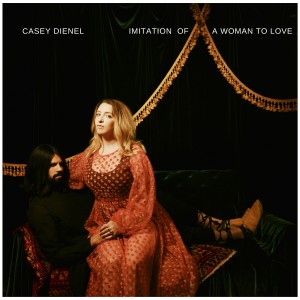
Artist

IMAGES: To download, click above. Photo credit to Shervin Lainez.
SINGLES:
“High Times”
LINKS:
Website
Twitter
Instagram
Soundcloud
Paddle Your Own Canoe Society
Casey Dienel
Paddle Your Own Canoe Society
Casey Dienel is a producer, singer and songwriter who under her given name and the moniker White Hinterland has released 4 critically acclaimed full-length albums. Raised in New England she has spent the last ten years creating music Nylon Magazine describes as “wild, vicious, poetic, feminine, brash, and singular.” On 2014’s White Hinterland release Baby Rolling Stone declared her vocal acrobatics “riveting—the music equivalent of pulling a floor lamp out of a handbag.” Employing multilayered vocals and a battery of synths, she has crafted a sonic world all her own. She divides her time between her studios in Scituate, MA and Brooklyn, NY.
Her fifth album Imitation Of A Woman To Love arrives May 18, 2017 via her imprint Paddle Your Own Canoe Society.
***************
Let’s get the obvious out of the way: this is not a White Hinterland release. Names are important. When I started out in 2005, I could never have dreamed where this new identity would take me. I grew up in a small beach town in Massachusetts with a funny last name no one could pronounce and spent most of my childhood there dying to get outside of it. I signed with a label hoping that a new moniker might transform me into someone confident and mysterious. Someone more beautiful and less messy, less opinionated and quick to offend. I didn’t believe I could get there by being myself, and frankly, it wasn’t entirely my fault for feeling that way.
All sides of the music industry tell women it’s not safe or suitable for them, swarming with projections of how we should be at every turn. We take so much pride in our work that we put up with the hard stuff: constantly defending our ideas and abilities, deflecting routine dismissals of our contributions, sometimes even enduring sexual harassment or assault. Women who write their own narratives, let alone produce them, can expect to be greeted with many obstacles. By the time I became White Hinterland I had already received the message that the worst thing for a woman to be was herself; untidy, un-contained and complicated. I thought if I put a forcefield between the work and my life I’d be protected in the long run. What I didn’t know then is that it takes a long time to grow into yourself but even longer to dismantle a myth. By the end of that journey, instead of protecting my life, I’d buried it. I felt exhausted.
Fast forward to 2015. Following two years on the road traveling and touring, I touched down as an artist in residence at the Hewnoaks Artist Colony in Lovell, ME. I spent the days with a portable studio set up in a cabin, and didn’t really see too much of anyone else. At first the quietude creeped me out. I didn’t relish the time alone with my thoughts. Most days began by building a fire, because even on the 4th of July you’ll freeze your ass off in Maine. I wrote when I felt like it and went hiking or swimming if I didn’t. I ate a lot of pancakes. If it sounds luxurious, let me tell you: it was. It’s cliche to venture into the woods like Thoreau and think you’ll come out with a masterpiece. My intention wasn’t to reconnect with myself or even nature. I just wanted to sing and move my body.
The only steadfast rule I gave myself was this: no more fucking rules. The personal and profane crept back in. I let songs ramble and shred apart, stopped thinking about singles or album format or censoring lyrics. Anger found its way through the new cracks, but so too did humor and joy. If 2014’s Baby, the last White Hinterland album, was the sound of an exit wound, this was laughter in the face of it. The songs took on a life of their own and by the end of my stay I realized I couldn’t go back to being “White Hinterland.” She taught me a lot of things but the old clothes didn’t fit. Literally. I’m no longer a size 4. It took another year and countless revisions to dismantle the mask, but by the end I found myself with songs best summed up as sounding a lot like me: brash, lusty, and irreverent. I wondered for months why I hadn’t shared this side of myself, why I felt I needed to edit or hide these things in my work—the closest thing to a safe space I’ve ever felt in my life.
The songs explore female sexuality and its many contradictions. How it feels to be at war not only with the world around you but within your own body. How even the strongest amongst us can still fall into the trap of performing an imitation of our best selves in order to feel worthy of love. I’m not just talking about romantic love, but the deep, abiding acceptance that emerges from self-respect and dignity. It feels to me sometimes the most radical thing we can do is love ourselves. It’s something we have to tend constantly to keep alive. It is not a Valhalla we all arrive at one day. It requires everyday acts of kindness towards ourselves, though some may try to convince us our voices, bodies, and lives are shameful or of less value than men’s.
I used to dread album synopses. Who, I wondered, besides press actually reads these things? I’ve come around to them because it’s invigorating how direct this exchange can be. This album was written and produced by the woman writing to you now—each stitch and every note was played or sung by her (barring a few sweet guitar licks on “Paper Mache” lovingly contributed by Matt LeMay). I chose to make it all myself to see what I sound like. I expected the process to be lonelier somehow, but it enlivened me. Now it’s in your hands and ears. No middle man, no tricks or gimmicks. You’re all too smart for that bullshit anyway. I’ve loved this record for a long time. It belongs to you now. Our world can be as direct or as bold as we choose to make it. In 2008 I wrote: “for the present and foreseeable future, there won’t be any more Casey Dienel.” At the time I really meant it; now it is unthinkable that I should be anyone else.
In 1875 the young women in my hometown organized for the first time to build a library. The town of Scituate gave no help to them but by working together the women managed to raise $3,500—first to cover the cost of erecting the building and then to fill it with 1,100 books. The annual circulation was 1,000 books, free to anyone in the town. They named it the Paddle Your Own Canoe Society because while it is up to each of us to put in the effort, our work takes on greater meaning when done together.
This record is in tribute to them and to nasty women everywhere. I see you. Imitation Of A Woman To Love comes to you via Paddle Your Own Canoe Society. Available worldwide May 18, 2017.
– Casey Dienel, April. 11 2017 Brooklyn, NY


